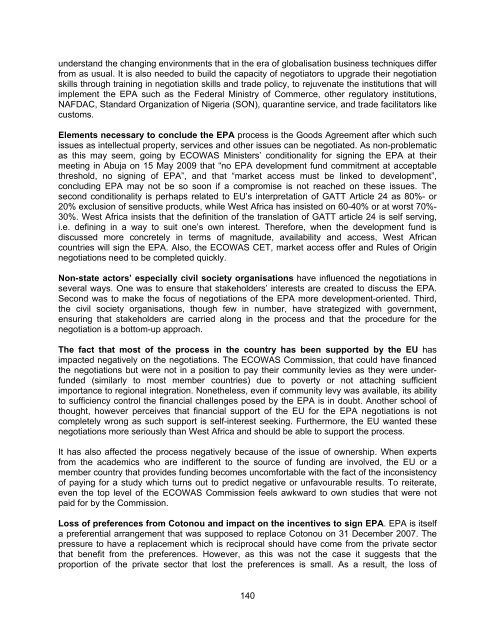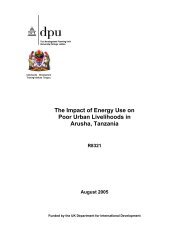EPA Review Annex Documents - DFID
EPA Review Annex Documents - DFID
EPA Review Annex Documents - DFID
Create successful ePaper yourself
Turn your PDF publications into a flip-book with our unique Google optimized e-Paper software.
understand the changing environments that in the era of globalisation business techniques differ<br />
from as usual. It is also needed to build the capacity of negotiators to upgrade their negotiation<br />
skills through training in negotiation skills and trade policy, to rejuvenate the institutions that will<br />
implement the <strong>EPA</strong> such as the Federal Ministry of Commerce, other regulatory institutions,<br />
NAFDAC, Standard Organization of Nigeria (SON), quarantine service, and trade facilitators like<br />
customs.<br />
Elements necessary to conclude the <strong>EPA</strong> process is the Goods Agreement after which such<br />
issues as intellectual property, services and other issues can be negotiated. As non-problematic<br />
as this may seem, going by ECOWAS Ministers’ conditionality for signing the <strong>EPA</strong> at their<br />
meeting in Abuja on 15 May 2009 that “no <strong>EPA</strong> development fund commitment at acceptable<br />
threshold, no signing of <strong>EPA</strong>”, and that “market access must be linked to development”,<br />
concluding <strong>EPA</strong> may not be so soon if a compromise is not reached on these issues. The<br />
second conditionality is perhaps related to EU’s interpretation of GATT Article 24 as 80%- or<br />
20% exclusion of sensitive products, while West Africa has insisted on 60-40% or at worst 70%-<br />
30%. West Africa insists that the definition of the translation of GATT article 24 is self serving,<br />
i.e. defining in a way to suit one’s own interest. Therefore, when the development fund is<br />
discussed more concretely in terms of magnitude, availability and access, West African<br />
countries will sign the <strong>EPA</strong>. Also, the ECOWAS CET, market access offer and Rules of Origin<br />
negotiations need to be completed quickly.<br />
Non-state actors’ especially civil society organisations have influenced the negotiations in<br />
several ways. One was to ensure that stakeholders’ interests are created to discuss the <strong>EPA</strong>.<br />
Second was to make the focus of negotiations of the <strong>EPA</strong> more development-oriented. Third,<br />
the civil society organisations, though few in number, have strategized with government,<br />
ensuring that stakeholders are carried along in the process and that the procedure for the<br />
negotiation is a bottom-up approach.<br />
The fact that most of the process in the country has been supported by the EU has<br />
impacted negatively on the negotiations. The ECOWAS Commission, that could have financed<br />
the negotiations but were not in a position to pay their community levies as they were underfunded<br />
(similarly to most member countries) due to poverty or not attaching sufficient<br />
importance to regional integration. Nonetheless, even if community levy was available, its ability<br />
to sufficiency control the financial challenges posed by the <strong>EPA</strong> is in doubt. Another school of<br />
thought, however perceives that financial support of the EU for the <strong>EPA</strong> negotiations is not<br />
completely wrong as such support is self-interest seeking. Furthermore, the EU wanted these<br />
negotiations more seriously than West Africa and should be able to support the process.<br />
It has also affected the process negatively because of the issue of ownership. When experts<br />
from the academics who are indifferent to the source of funding are involved, the EU or a<br />
member country that provides funding becomes uncomfortable with the fact of the inconsistency<br />
of paying for a study which turns out to predict negative or unfavourable results. To reiterate,<br />
even the top level of the ECOWAS Commission feels awkward to own studies that were not<br />
paid for by the Commission.<br />
Loss of preferences from Cotonou and impact on the incentives to sign <strong>EPA</strong>. <strong>EPA</strong> is itself<br />
a preferential arrangement that was supposed to replace Cotonou on 31 December 2007. The<br />
pressure to have a replacement which is reciprocal should have come from the private sector<br />
that benefit from the preferences. However, as this was not the case it suggests that the<br />
proportion of the private sector that lost the preferences is small. As a result, the loss of<br />
140
















